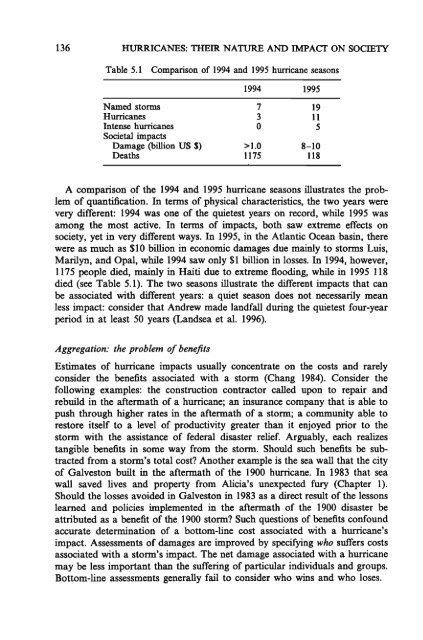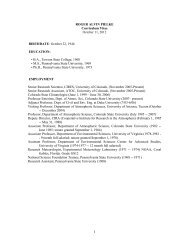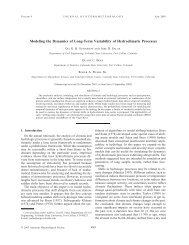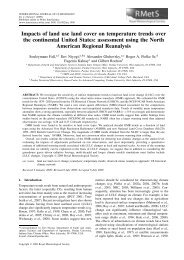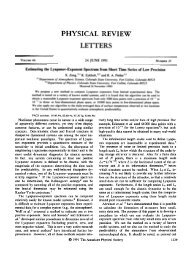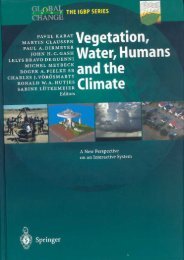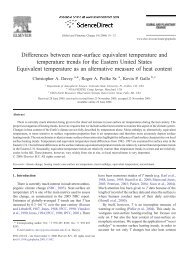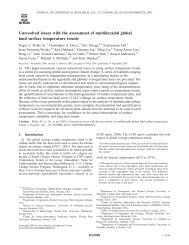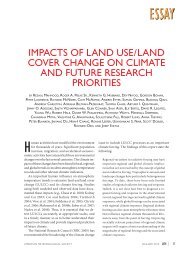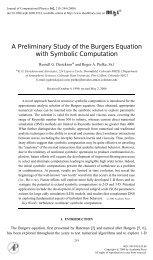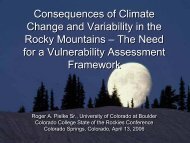Hurricanes: Their Nature and Impacts on Society - Climate Science ...
Hurricanes: Their Nature and Impacts on Society - Climate Science ...
Hurricanes: Their Nature and Impacts on Society - Climate Science ...
You also want an ePaper? Increase the reach of your titles
YUMPU automatically turns print PDFs into web optimized ePapers that Google loves.
136 HURRICANES: THEIR NATURE AND IMPACT ON SOCIETY<br />
Table 5.1 Comparis<strong>on</strong> of 1994 <str<strong>on</strong>g>and</str<strong>on</strong>g> 1995 hurricane seas<strong>on</strong>s<br />
Named storms<br />
<str<strong>on</strong>g>Hurricanes</str<strong>on</strong>g><br />
Intense hurricanes<br />
Societal impacts<br />
Damage (billi<strong>on</strong> US $)<br />
Deaths<br />
1994 1995<br />
7<br />
3 0<br />
>1.0<br />
1175<br />
19<br />
11 5<br />
8-10<br />
118<br />
A comparis<strong>on</strong> of the 1994 <str<strong>on</strong>g>and</str<strong>on</strong>g> 1995 hurricane seas<strong>on</strong>s illustrates the problem<br />
of quantificati<strong>on</strong>. In terms of physical characteristics, the two years were<br />
very different: 1994 was <strong>on</strong>e of the quietest years <strong>on</strong> record, while 1995 was<br />
am<strong>on</strong>g the most active. In terms of impacts, both saw extreme effects <strong>on</strong><br />
society, yet in very different ways. In 1995, in the Atlantic Ocean basin, there<br />
were as much as $10 billi<strong>on</strong> in ec<strong>on</strong>omic damages due mainly to storms Luis,<br />
Marilyn, <str<strong>on</strong>g>and</str<strong>on</strong>g> Opal, while 1994 saw <strong>on</strong>ly $1 billi<strong>on</strong> in losses. In 1994, however,<br />
1175 people died, mainly in Haiti due to extreme flooding, while in 1995 118<br />
died (see Table 5.1). The two seas<strong>on</strong>s illustrate the different impacts that can<br />
be associated with different years: a quiet seas<strong>on</strong> does not necessarily mean<br />
less impact: c<strong>on</strong>sider that Andrew made l<str<strong>on</strong>g>and</str<strong>on</strong>g>fall during the quietest four-year<br />
period in at least 50 years (L<str<strong>on</strong>g>and</str<strong>on</strong>g>sea et al. 1996).<br />
Aggregati<strong>on</strong>: the problem of benefits<br />
Estimates of hurricane impacts usually c<strong>on</strong>centrate <strong>on</strong> the costs <str<strong>on</strong>g>and</str<strong>on</strong>g> rarely<br />
c<strong>on</strong>sider the benefits associated with a storm (Chang 1984). C<strong>on</strong>sider the<br />
following examples: the c<strong>on</strong>structi<strong>on</strong> c<strong>on</strong>tractor called up<strong>on</strong> to repair <str<strong>on</strong>g>and</str<strong>on</strong>g><br />
rebuild in the aftermath of a hurricane; an insurance company that is able to<br />
push through higher rates in the aftermath of a storm; a community able to<br />
restore itself to a level of productivity greater than it enjoyed prior to the<br />
storm with the assistance of federal disaster relief. Arguably, each realizes<br />
tangible benefits in some way from the storm. Should such benefits be subtracted<br />
from a storm's total cost? Another example is the sea wall that the city<br />
of Galvest<strong>on</strong> built in the aftermath of the 1900 hurricane. In 1983 that sea<br />
wall saved lives <str<strong>on</strong>g>and</str<strong>on</strong>g> property from Alicia's unexpected fury (Chapter 1).<br />
Should the losses avoided in Galvest<strong>on</strong> in 1983 as a direct result of the less<strong>on</strong>s<br />
learned <str<strong>on</strong>g>and</str<strong>on</strong>g> policies implemented in the aftermath of the 1900 disaster be<br />
attributed as a benefit of the 1900 storm? Such questi<strong>on</strong>s of benefits c<strong>on</strong>found<br />
accurate determinati<strong>on</strong> of a bottom-line cost associated with a hurricane's<br />
impact. Assessments of damages are improved by specifying who suffers costs<br />
associated with a storm's impact. The net damage associated with a hurricane<br />
may be less important than the suffering of particular individuals <str<strong>on</strong>g>and</str<strong>on</strong>g> groups.<br />
Bottom-line assessments generally fail to c<strong>on</strong>sider who wins <str<strong>on</strong>g>and</str<strong>on</strong>g> who loses.


